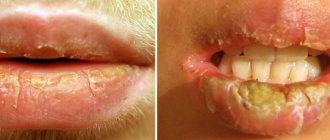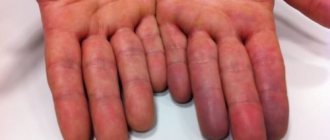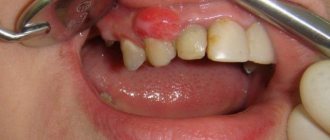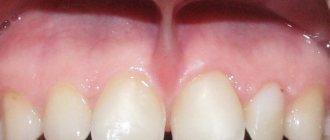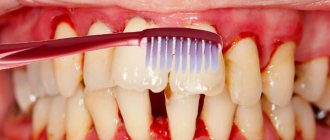When nothing bothers a person, life seems easy and wonderful, but as soon as something starts to hurt, some unpleasant sensations appear, then life immediately changes dramatically, not for the better. It is no secret that a person always needs comfort and peace of mind regarding health. As soon as you feel any unpleasant symptoms, you should not leave it to chance, as this can turn out very badly for your health and life.
If your mouth is bothering you...
Today we will talk about the oral cavity and everything connected with it. As you know, the oral cavity is the best indicator of the condition of your digestive tract. Therefore, when you begin to feel any unpleasant sensations that bother you more and more, you should definitely contact a specialist at a clinic or treatment center. Any signals that come from the oral cavity must be investigated, and all the reasons for their occurrence must be clarified.
Why persimmons make your mouth stick, how to get rid of the viscosity
There are many fans of the bright orange oriental fruit called persimmon.
They look forward to its appearance on the shelves in winter and choose it with passion so that the fruit is juicy, soft, with delicate skin. The fact is that unripe persimmons are astringent, and ripe fruits sometimes leave a slight tart aftertaste. But don't worry about this.
There are different ways to rid a healthy fruit of such an unpleasant property.
Why do persimmons make your mouth stick?
Unripe persimmons contain tannins (tannic acids), which have the ability to bind the mouth. Tannins with astringent properties, when in contact with the mucous membrane in the oral cavity, cause coagulation of protein structures. In this reaction lies the answer to the question why persimmons knit.
Although tannins are anti-inflammatory substances, in large quantities (and persimmon contains quite a lot of them) they cause unexpected reactions:
- constrict blood vessels;
- reduce the secretion of the salivary glands, causing slight numbness;
- reduce gastrointestinal motility.
So persimmon not only has the property of tying the mouth, but also causes numbness in the tongue, which makes it worse to move. It can disrupt the functioning of the digestive tract, causing intestinal colic and upset. Become one of the causes of respiratory tract spasm due to the presence of fiber fibers with strong tanning properties. Ripe fruit does not have such a negative effect on the body.
In Israel, breeders have created a variety of persimmon that does not have astringent properties. They crossed persimmons with apples and developed the seedless Sharon variety, which today is considered the best and most expensive.
How to make persimmon non-astringent
There are different options for making persimmons sweet, from simple to the most amazing. Using artificial methods, you can achieve ripeness of the orange fruit in a very short time.
If persimmons are astringent and you want to eat them quickly, then there is a simple method: you need to pierce the fruit with a needle in several places, leave it at room temperature for several hours and feel free to use it as a dessert.
Freezing and heat treatment
Tart persimmons stop gnawing at the mouth if they are frozen. This is done simply:
- rinse and dry the fruits;
- wrap in a plastic bag and place in the freezer;
- keep for 5-12 hours.
Persimmons do not knit after freezing; they become soft, but become rather tasteless, so it is better to eat them frozen. In this form, the fruit looks a little like sherbet.
The feeling of viscosity also disappears during heat treatment. To do this, the peel is pierced in several places and filled with hot water, the temperature of which must be maintained by adding new portions of liquid. After a few hours, the persimmon stops knitting and becomes soft and sweet.
Various desserts are prepared from the “orange apple” by exposing it to temperatures. At the same time, the amount of tannins is significantly reduced, the persimmon becomes not just tasty, but very tasty. To do this, just cook and taste compote or jelly, prepare soufflé or jam, make preserves or marmalade.
When purchasing, choose ripe fruits that are suitable for consumption. They have thin skin, dark orange color, and a dry stalk. The flesh should be brown when cut.
Ripening
Hard, yellow, unripe persimmons sting my mouth, what should I do? She needs to lie at home for two weeks so that she is ready to eat. The fruits are packed in a box or box and forgotten about them for a while. Sometimes orange fruits are specially bought unripe, and then ripen for some holiday or the arrival of guests.
Types of dry mouth
Dry mouth is divided into several types, so there is no need to immediately get scared and sound the alarm. We suggest looking at each type in more detail:
- Dryness, which usually occurs in the morning after waking up:
- alcohol taken the day before can cause severe dryness of the entire oral cavity;
- temporary disruption of nasal breathing, as a result of which a person breathes through the mouth and experiences specific dry mouth (this can be a runny nose, snoring, weakening of the muscle tone of the soft palate).
- Constant dryness in the mouth develops for other reasons:
- Constant smoking can cause constant dry mouth;
- consuming large amounts of kitchen salt will also not please your body, and you will get an unpleasant surprise in the form of dry mouth;
- taking narcotic drugs can affect salivation disorders, which will certainly affect the oral cavity;
- During menopause, women can also expect dry mouth;
- Many older people may also notice that dry mouth has become a very serious problem.
- Short-term dry mouth occurs for other reasons:
- such dryness can appear after prolonged physical activity;
- also, when staying in a hot climate, you will feel how dryness envelops the entire oral cavity;
- While taking certain medications, you will notice that dryness also causes you some discomfort.
Above we listed all the reasons why dryness occurs without any disease, and now it’s worth talking about if, after all, dryness occurs precisely because of the presence of a disease in the body.
Constant viscosity
Constant viscosity in the mouth, which is observed in a person every day, regardless of his daily routine and diet, is usually due to the following factors :
- Poisoning of the body with various foods or chemicals. In this state, severe intoxication will be observed, which, in addition to headache, nausea and vomiting, can also provoke an unpleasant bitter taste and viscosity.
- Severe dehydration of the body can lead to this symptom, as well as constant drying of the oral cavity. It is important to note that pathological dry mouth is very dangerous, since in this condition a person becomes more susceptible to the development of pathogenic microflora in the mouth, which in turn threatens the development of a number of diseases of the teeth, gums and tongue.
- Constant use of various drugs and medications.
- Exposure to bad habits, in particular chewing tobacco or smoking cigarettes containing it. In turn, these actions negatively affect the oral mucosa, leading to a decrease in saliva production.
Viscosity may occur while taking certain medications.
- The predominance of salty foods in the diet, which contribute to increased thirst. In turn, in this state, a person begins to drink a lot of fluid, which impairs kidney function and leads to increased blood pressure. Ultimately, as a result of such a chain reaction, a person may experience viscosity in the oral cavity.
- Progression of severe chronic diseases of the body. A person especially often observes similar symptoms in the mouth with hypertension or diabetes. Moreover, in the latter case, the patient may also suffer from severe thirst, increased sweating and frequent urge to urinate.
- The development of anemia, which can be caused by quite a variety of reasons (from a sharp decrease in immunity after taking potent medications to the influence of progressive diseases).
- Diarrhea that occurs more than twice a day automatically leads to severe dehydration and, as a result, dry mouth.
- Inflammatory processes in the salivary glands, which are often observed in elderly people. This is justified by purely physiological changes in the aging body.
- Severe sexually transmitted diseases that cannot be treated (HIV infection).
- Various neuritis, as well as damage to nerve fibers in the neck and head.
Viscosity is one of the symptoms of dehydration.
How to deal with this problem
Before starting treatment, it is necessary to find out the exact problem of the formation of these symptoms. If, however, this is not associated with any disease, then you need to undergo a dehydration procedure. After this, be sure to drink plenty of water, suck on lozenges, visit the dentist periodically and have all your teeth treated.
Bad taste in the mouth
- Bitter taste
Bitterness in the mouth indicates stagnation of bile in the body. This means that the liver cannot cope, cholecystitis - inflammation is possible, and problems with the biliary tract are also possible.
What to do? Drink as much water as possible, remove everything fatty, fried, pickled, and salty from your diet. If you continue to experience a bitter taste in your mouth while following this diet, consult your doctor immediately.
The cause of a bitter taste in the mouth can also be “lazy intestines”: a state of the body when food is poorly digested and stagnates in the body.
What to do? Eat as many fresh fruits and vegetables as possible. You can drink herbal teas that enhance intestinal motility. Brew horsetail, calendula, mint.
Another reason is frequent consumption of alcoholic beverages. This clogs up your poor liver!
What to do? Avoid alcoholic drinks and also conduct a liver cleansing course. Don’t forget about your diet and limit yourself to fatty and sweet foods.
DepositPhotosTaste of hydrogen sulfide
Perhaps the most disgusting taste that exists in the world! If you feel the taste of hydrogen sulfide in your mouth in the morning, it means that your stomach is not producing enough gastric juice. This happens with gastritis with low acidity.
What to do? To increase the secretion of gastric juice, you need to eat more spicy and fried foods. Under no circumstances should you overeat, especially at night! If you feel in your gut that you have problems digesting food, consult a doctor: he will prescribe special medications that will help you cope with this problem.
DepositPhotos Salty taste
Fun fact: our saliva contains a lot of sodium chloride - salt. When the body lacks water, all fluids thicken, including saliva. This is how this strange salty taste arises in the mouth!
The salt on your lips will disappear if you drink 2 liters of water a day. This problem is familiar to people who are addicted to alcohol. Beer and wine remove moisture from the body, which is why after drinking alcoholic beverages the next morning you are so thirsty!
DepositPhotosSweet taste
A sweet taste in the mouth, especially in the morning, is an extremely unpleasant signal. This means that your blood sugar levels are high! You can get diabetes at any time, because our food is oversaturated with sugar...
If you regularly feel sweetness in your mouth, you should visit a doctor. We recommend that you be examined by an endocrinologist and get tested! Diabetes is no joke
If you do not pay attention to the earliest symptoms, you can pay not only with your health, but also with your life...
DepositPhotosSour taste
A sour taste in the mouth is a sign of increased stomach acidity. If hydrochloric acid, which is produced to digest food, is produced in excess by the stomach, sourness appears in the mouth.
Avoiding fatty, spicy and sweet foods will help! Of course, an examination by a specialist will not hurt at all. The doctor will prescribe medications that reduce acidity. A sour taste in the mouth can also be the result of a malfunction of the pancreas, for example, after an overly luxurious feast.
DepositPhotosMetallic taste
A metallic taste in the mouth indicates periodontal disease and other oral diseases. Also, these strange sensations can appear after poisoning with heavy metals, for example, mercury, arsenic, lead. This taste may also accompany certain medications, such as metronidazole.
If you often have a sore mouth after eating various fruits, you should rinse your mouth with soda. Unpleasant sensations in the mouth will immediately disappear, and tooth enamel will not be damaged!
Smoking is a reason to visit the dentist as often as possible. If you smoke, an unpleasant taste may result from an abundance of microbes in your mouth.
It’s worth keeping an eye on your health in the smallest detail so that you don’t get seriously ill later!
Share this truly useful post with your friends! I'm sure it will be useful to them.
Causes of the problem
Constant astringency in the mouth indicates the following pathological conditions:
- HIV AIDS;
- impaired glucose tolerance;
- Hodgkin's disease (oncological disease affecting the lymphatic system);
- cystic fibrosis;
- parkinsonism;
- iron deficiency in the body due to an unbalanced diet;
- hormonal imbalance;
- breathing problems;
- diarrhea;
- damage to muscle or nerve fibers localized in the neck;
- age-related changes.
In rare cases, discomfort in the mouth that persists for a long time may occur after surgery to remove the salivary glands or be the result of a head injury.
Dry mouth, lips, and throat can be temporary, permanent, or morning
Temporary astringent sensations are usually associated with:
- consuming large amounts of excessively salty foods;
- runny nose (acute, chronic);
- insufficient humidity and high air temperature in the living room;
- long-term high-intensity sports;
- smoking (including hookah - smoke dries out the oral mucosa).
Dryness and accompanying symptoms may appear the next day after taking certain drugs.
Medicines
The reasons for the appearance of a feeling of viscosity on the oral mucosa may lie in drug treatment. Most often, changes in taste sensations are provoked by the following drugs: anxiolytics (anti-anxiety drugs), analgesics, laxatives, antifungal and antihistamine medications.
Important! It is noteworthy that dietary supplements can also cause discomfort and a tart taste in the mouth and lips. If such a problem arises, you should carefully read the instructions for the dietary supplement - perhaps a feeling of viscosity on the oral mucosa is listed as a side effect.
Other factors
Sticky saliva after eating is a common problem that many people experience. So, it dries and astringents the mouth after persimmon - a healthy fruit rich in vitamins and minerals, which contains tannin in large quantities (it is this substance that causes some discomfort). To avoid unpleasant sensations, lovers of this fruit can first place it in the freezer, dry it, or, conversely, heat it.
If the feeling of astringency, viscosity in the oral cavity is accompanied by the appearance of plaque on the tongue, these are sure signs of diseases of the digestive tract (stomach, liver, gall bladder)
Causes of astringent taste in mouth – VospalenieKishechnika
One of the symptoms of the development of diseases of internal organs is a sweetish taste in the mouth. If a sweet taste appears in the mouth, the reasons in adults often lie in many pathological processes in the internal organs and systems. Why this symptom appears and how to get rid of it should be understood in more detail.
What diseases cause a sweet taste in the mouth?
If your breath smells sweet, you need to pay attention to what other symptoms are present. According to the results of many analyzes and studies, a sweet taste appears during chronic inflammatory processes in the digestive tract. The main causes of sweetness in the mouth include:
- A change in diet contributes to the development of a sweet aroma and taste in the mouth. When a person follows a diet, changes occur in his body, metabolism in the body improves, and he uses accumulated lipid reserves as an energy reserve. And when fats decompose, taste sensations change.
- The main cause of diabetes is a sweetish taste and odor from the mouth. With the development of this disease, malfunctions in the body’s functioning occur, the level of glucose in the body changes, it does not enter the cells, so they begin to destroy fat accumulations in order to replenish energy reserves. Digested fat is converted into ketone bodies, which enter the lungs through the bloodstream. This is what explains the sweet smell and taste.
- The appearance of a sweetish aroma, stinking breath in severe kidney damage.
- If a person suffers from liver failure, this taste and smell may occur.
- The appearance of an unpleasant symptom may be associated with the development of an infectious process, in particular diphtheria.
- Lung disease may also be the cause.
- Gastrointestinal diseases are accompanied by this symptom. Symptoms of sweets are felt in breathing and heartburn.
- With developing pathologies in the pancreas, sweet breath also occurs.
- During pregnancy, glucose levels in the body may increase.
- With nervous overstrain, a person also experiences a similar symptom.
Rare causes of the appearance of the symptom include: Kaposi's sarcoma, precancerous condition of the mucous membrane, tumors of the tongue, aphthous stomatitis, herpes or chlamydial infection.
Not only stomach diseases can be accompanied by a similar phenomenon. With a deficiency of vitamin substances, it is a frequent companion of the human body.
With constant nasal congestion, changes occur in the composition of the microflora in the oral cavity, resulting in an unpleasant odor.
Bad habits and sweetish breath
Bad breath in an adult can be caused by smoking after each meal. Alcoholic drinks and smoking can all cause unpleasant symptoms. If you drink too much alcohol, you will notice the smell of alcohol after a while. It is intensively broken down in the body, and after a while a sweetish aroma and taste is felt.
Experienced smokers develop a sweetish-putrid odor, which becomes more intense after eating. This symptom should not be ignored; it is important to monitor the condition of the body, visit a doctor on time and find out why such a taste and aroma appears in the mouth.
Sweet taste during pregnancy
The sugary smell of corn from the mouth often appears during pregnancy. Why does the aroma of sweetness appear at this time? This symptom indicates changes in the body. Metabolism in the body increases, and fat reserves are intensively broken down.
This is necessary in order to ensure the full development of the growing fetus. In such cases, the liver and pancreas function at an accelerated rate, being under constant tension. This explains the appearance of unusual symptoms.
Stress as a cause of odor
Sweetish breath is not only a sign that there are disease problems. Breath often smells like this if a person experiences constant stress or is in systematic nervous overstrain. After experiencing stress, a person experiences a lack of vitamin substances, and the production of salivary fluid increases.
If the stressful situation is prolonged, in some cases the teeth and gums suffer. With increased anxiety and sudden mood swings, the duration of the putrid-sweet odor is prolonged, and dryness of the oral mucosa occurs. In this case, you will need diagnosis and treatment, taking sedatives and sedatives prescribed by the doctor.
What examination is needed and who to contact?
If the cause is diet, this is a temporary phenomenon. When the usual diet is resumed, it goes away on its own. If you are stressed, it is recommended to visit a neurologist, psychologist or psychiatrist. There is no way around this without treatment. Usually in this case a course of sedatives is prescribed.
If the unusual smell and taste persists and you cannot find out the cause on your own, the first thing you can do is visit specialized specialists who can help in this case:
- Visit a therapist who will tell you what it could be and refer you for tests and consultation with other specialists.
- Donate blood for biochemical indicators and sugar levels to rule out the development of dangerous diseases.
- Get examined by a dentist and undergo treatment if necessary.
- Visit an endocrinologist to find out if there are pathologies of the thyroid gland.
- Adjust nutrition to restore the functions of the digestive system.
Symptomatic treatment
To refresh the oral cavity and eliminate the unpleasant sensation, you can use: chewing gum, special lollipops, rinses, and reduce the amount of carbohydrates consumed.
If any problems are detected with the mouth or abdominal organs, treatment is symptomatic and is prescribed only by a specialist. After eliminating the main cause, the unpleasant sensation will go away on its own.
tvoyzubnoy.ru
Constant viscosity
If viscosity in the mouth arose a long time ago and does not disappear for a long time, then it may indicate that a person has the following diseases or pathological conditions:
- HIV AIDS;
- impaired glucose tolerance, diabetes mellitus;
- cystic fibrosis;
- Hodgkin's disease (oncological process occurring in the lymphatic system);
- parkinsonism;
- chronic lack of iron in the blood caused by poor diet or diseases of the digestive system;
- high blood pressure;
- diarrhea;
- hormonal fluctuations (this is why pregnant women often complain that they have a sticky mouth);
- breathing problems (occurs in patients who snore or constantly breathe through their mouth);
- weakening of the muscle strength of the palate;
- inflammatory diseases of the oral cavity;
- age-related changes (with aging, the amount of saliva produced sharply decreases);
- damage to nerve fibers located in the neck and head.
In more rare cases, the cause of persistent viscosity is previous surgery to remove the salivary glands or severe head trauma.
Temporary viscosity
As for the situation when a patient periodically has a sticky mouth, the reasons for this may be the following:
- eating salty foods;
- presence of a runny nose;
- too high temperature in the house and/or low humidity;
- long and intense sports training;
- smoking cigarettes or hookah (smoke dries out the mucous membranes).
In addition, discomfort may appear if the person consumed narcotic or toxic substances the day before. This symptom indicates severe intoxication of the body. For the same reason, viscosity develops during a course of radiation therapy and chemotherapy.
Viscosity due to drugs
Sometimes there is a sticky feeling in the mouth while taking certain medications.
https://www.youtube.com/watch?v=jle6zBLGe8s
The most often unpleasant symptoms are provoked by medications of the following groups:
- anxiolytics (anti-anxiety);
- antidepressants;
- laxatives;
- analgesics;
- antihistamines (against allergies);
- antifungal tablets.
It is worth saying that some dietary supplements for weight loss also cause a feeling of viscosity in the mouth. If discomfort develops during treatment of any disease, the patient is advised to carefully study the instructions for the drug. If it has such an effect, it will definitely be written about.
Viscosity after eating persimmon
Persimmon contains a huge amount of vitamins and microelements, making it not only tasty, but also extremely healthy.
However, sometimes, after coming home from the store and tasting the purchased fruits, the buyer is disappointed. The persimmon turns out to be absolutely not sweet, there is an unpleasant sensation - it sticks in the mouth.
It has this property due to its high tannin content. It is also often called tannic acid.
It forms various chemical bonds with polysaccharides of natural origin, resulting in a tanning effect.
Tannin, which is contained not only in the fruits, but also in the leaves, as well as the bark of the plant, protects them from being eaten by various animals.
It is worth noting that tannic acid in small dosages does not harm the body. Moreover, it has a beneficial effect on the digestive organs and calms the nervous system.
Patients who have recently undergone surgery on the abdominal organs should be careful in this case.
If a person does not like tart persimmons, then he can easily change its properties by putting the fruits in the freezer for several hours. Also, if desired, they can be placed in the same bag with apples. The latter produce ethylene, a substance that accelerates the ripening process of persimmons.
You can also get rid of astringency by heat treating the fruits or drying them. The same rules apply to sloe berries.
Diagnosis of causes
If a patient has a sticky mouth, the symptoms that accompany this condition must be taken into account.
So, if discomfort is accompanied by weakness and nausea (which can result in vomiting), it means that he has a stomach pathology (usually gastritis). If all this is accompanied by a high temperature, the patient has probably “caught” a viral or bacterial infection.
Viscosity in the mouth combined with a bitter taste and pain in the side on the right side indicates the presence of gallstones.
Sometimes discomfort is accompanied by the presence of a metallic taste in the mouth. This indicates gum disease.
In addition, if the patient has a sticky mouth, the reasons for this can be identified by
- examination of the oral cavity;
- general blood and urine analysis;
- hormonal research;
- blood tests for vitamins and minerals;
- Ultrasound of the abdominal cavity;
- endoscopic examination of the stomach;
- MRI of the head and neck;
- analysis for infections;
- analysis for tumor markers, etc.
In addition, during diagnosis, it is imperative to measure the patient’s blood pressure.
Consequences
Treatment in this case consists of eliminating the underlying pathology that causes the mouth to stick.
If this is not done, insufficient saliva will increase the risk of oral diseases. In addition, a malfunction of the salivary glands will sooner or later negatively affect the protective functions of the mucous membranes. The result of this can be candidiasis, stomatitis, sore throat, caries and many other diseases.
Also, do not forget that the underlying disease is getting worse every day. That is why it is so important not to delay time, but to go to the doctor. In this case, go to a therapist, and he, in turn, will refer you to another, more specialized specialist. As a rule, see a neurologist, gastroenterologist or dentist.
.ru
If your mouth is bothering you...
Today we will talk about the oral cavity and everything connected with it. As you know, the oral cavity is the best indicator of the condition of your digestive tract.
Therefore, when you begin to feel any unpleasant sensations that bother you more and more, you should definitely contact a specialist at a clinic or treatment center.
Any signals that come from the oral cavity must be investigated, and all the reasons for their occurrence must be clarified.
Main symptoms of diseases of the digestive tract
There are a variety of symptoms of diseases of the digestive tract, but today we will pay special attention to when a person has a sticky mouth. Almost all of us have tried persimmon; it is this tart fruit that gives a similar effect to diseases of the digestive tract.
Source: https://vospaleniekishechnika.life/simptomy/vyazhushhij-vkus-vo-rtu-prichiny.html
What to do? when to see a doctor?
In cases where dry mucous membranes are not associated with painful conditions of the body, it can be eliminated by eliminating the provoking causes.
In a situation where, in addition to dry mouth, you are concerned about other manifestations of problems in the functioning of organs and systems described above, it is advisable to read a full medical examination for timely detection of diseases and initiation of treatment.
If you are worried about nausea, dry mouth, or a white coating on your tongue, then visit an experienced gastroenterologist. If you have increased thirst and weight loss, get examined by an endocrinologist. In case of infectious diseases, drink as much fluid as possible and take appropriate medications.
Eliminating the causes of dry mouth at night associated with mouth breathing or snoring comes down to normalizing and controlling night breathing. It is possible to use special anti-snoring clips.
Diagnostics
Since astringency and dry mouth can be associated with various pathological conditions and malfunctions of the body, only a doctor should determine the cause of this phenomenon, based on the accompanying manifestations. Thus, a tart taste, viscosity in the oral cavity in combination with general weakness, white tongue nausea, pain in the stomach, as a rule, indicate gastritis (inflammation of the mucous membrane of this digestive organ). It is also accompanied by the release of acid from the stomach into the esophagus (heartburn).
The feeling of viscosity on the oral mucosa is a signal notifying of various health problems.
If all of the above is also accompanied by a high body temperature, we are talking about a bacterial or viral infection. Viscosity, mucus, bitter taste, gray coating on the tongue, accompanied by acute pain in the right hypochondrium, indicate the presence of gallstones.
Important! The presence of a metallic taste in the mouth is a sure symptom of gingivitis (inflammation of the gums).
You can determine why your mouth feels sticky using the following diagnostic methods:
- professional examination of the oral cavity by a dentist;
- hormonal research;
- urine and blood tests (including vitamins and minerals);
- Ultrasound of the abdominal organs;
- MRI of the head and neck;
- endoscopic examination of the condition of the gastric mucosa;
- tests for tumor markers, infections, etc.
In addition, during the examination, the doctor must constantly monitor the patient’s blood pressure, since its “jumps” can also be one of the factors causing the appearance of viscosity on the oral mucosa.
How to treat?
Methods for treating dry mouth and frequent urination depend on the cause that gave rise to this phenomenon. First of all, you need to consult a doctor for a comprehensive diagnosis, since this symptom complex can be caused by a variety of problems.
Diagnosis by an endocrinologist and urologist is necessary:
- genitourinary system (conditions of the kidneys and urinary tract);
- endocrine (checking for the presence of various forms of diabetes);
- research into the possibility of the presence of pathologies of an infectious nature.
A blood test for glucose levels, general diagnostics of the patient's blood and urine samples, ultrasound of the urinary organs and other tests are performed at the discretion of the doctor. After establishing an accurate diagnosis and the causes of the phenomenon, a way to eliminate the problem is chosen. First of all, any treatment involves giving up bad habits: you should completely eliminate alcohol and stop smoking, it is advisable to eliminate caffeinated drinks and stick to a diet with a minimum of fried foods and salty foods. To stimulate salivation, hot pepper can be used as a seasoning.
Further therapeutic measures depend on the problem that caused the described symptoms:
- for diabetes mellitus, insulin therapy is prescribed, aimed at replenishing the deficiency of this substance in the body;
- Diabetes insipidus requires specific treatment with drugs containing the antidiuretic hormone vasopressin: desmopressin or antidiuretin DM; the long-acting agent Pitressin Tanate is also used. Lithium and other medications may be prescribed at the discretion of the physician;
- in the presence of infectious and inflammatory pathologies, treatment is aimed at eliminating them through the use of specific antibiotics and anti-inflammatory drugs;
- to eliminate dehydration and alleviate the patient’s condition, additional volumes of fluid can be introduced into the body - both in the form of drinking and intravenously;
- You should stop taking diuretics if you are taking them.
We suggest you familiarize yourself with Soda and salt solutions for rinsing teeth
It is important to remember that prescribing treatment on your own is dangerous; you need to contact a specialist who can accurately determine the cause of dryness and frequent urination and choose the appropriate treatment.
